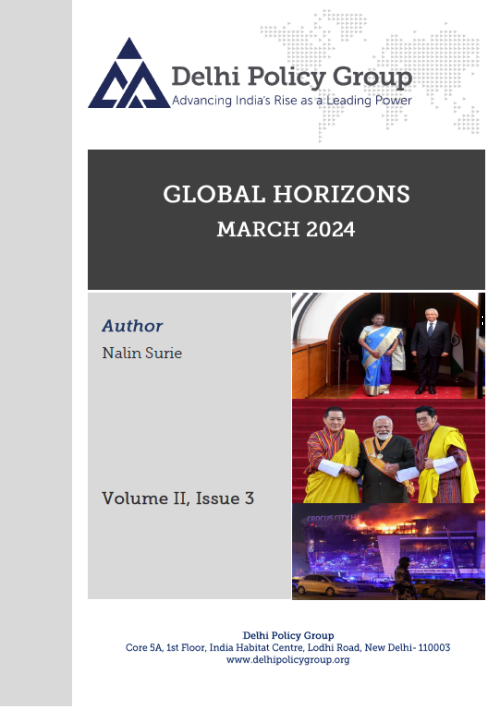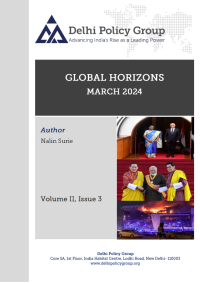Global Horizons
Date: April 04, 2024
This issue covers important developments during the month which are likely to have consequences for international peace and security going forward, as well as noteworthy progress in India’s relations with key regional partners.
The author begins by highlighting that there was no respite from the horrors of war and the indiscriminate killing of civilians during March, be it in Ukraine or Palestine, even as the desperate situation of civilians caught up in Sudan’s internal conflict is becoming the biggest global hunger and displacement crisis.
Ukraine’s predicament with regard to supplies of military equipment from the US continued, with the anticipated re-election of President Putin in Russia adding to pressures on Kyiv.
In the Israel-Hamas war, the situation turned even more grim with Israel’s unrelenting military operations causing extensive collateral damage, a rising civilian death toll, and virtual famine in Gaza. Israel warded off US pressures, firm in the knowledge that the US will continue to supply military wherewithal it needs to continue operations.
The author then draws attention to important outcomes of the annual meeting of the National People’s Congress in China, laying out the focus on a new pattern of development in the years ahead.
Meanwhile, in Europe, the European Council adopted important decisions with a bearing on Europe’s future defence and security posture, which could lead to the scaling up of Europe’s own capability and contributions to European stability.
Significant developments in Indian diplomacy during the month included the President’s State Visit to Mauritius from March 11-13, and Prime Minister’s official visit to Bhutan on March 22-23. Major announcements were made regarding India’s development projects in the Agalega island of Mauritius, and India’s support for Bhutan’s next Five-Year Plan was doubled from the previous Plan.
The Foreign Minister of Ukraine, Dmytro Kuleba, paid an official visit to India on March 28-29, in an effort to reach out to countries which have kept a distance from the war in Ukraine. The two sides are likely to convene a meeting of the bilateral Inter-governmental Commission later this year.
Finally, as Indian general elections get underway, the author concludes that while the next government in New Delhi will inherit a complex set of foreign and security policy challenges, a strong foundation has already been laid for India to pursue its core national, security and development interests.
To read this Global Horizons, Vol. II, Issue 3, please see the PDF attached.
The author begins by highlighting that there was no respite from the horrors of war and the indiscriminate killing of civilians during March, be it in Ukraine or Palestine, even as the desperate situation of civilians caught up in Sudan’s internal conflict is becoming the biggest global hunger and displacement crisis.
Ukraine’s predicament with regard to supplies of military equipment from the US continued, with the anticipated re-election of President Putin in Russia adding to pressures on Kyiv.
In the Israel-Hamas war, the situation turned even more grim with Israel’s unrelenting military operations causing extensive collateral damage, a rising civilian death toll, and virtual famine in Gaza. Israel warded off US pressures, firm in the knowledge that the US will continue to supply military wherewithal it needs to continue operations.
The author then draws attention to important outcomes of the annual meeting of the National People’s Congress in China, laying out the focus on a new pattern of development in the years ahead.
Meanwhile, in Europe, the European Council adopted important decisions with a bearing on Europe’s future defence and security posture, which could lead to the scaling up of Europe’s own capability and contributions to European stability.
Significant developments in Indian diplomacy during the month included the President’s State Visit to Mauritius from March 11-13, and Prime Minister’s official visit to Bhutan on March 22-23. Major announcements were made regarding India’s development projects in the Agalega island of Mauritius, and India’s support for Bhutan’s next Five-Year Plan was doubled from the previous Plan.
The Foreign Minister of Ukraine, Dmytro Kuleba, paid an official visit to India on March 28-29, in an effort to reach out to countries which have kept a distance from the war in Ukraine. The two sides are likely to convene a meeting of the bilateral Inter-governmental Commission later this year.
Finally, as Indian general elections get underway, the author concludes that while the next government in New Delhi will inherit a complex set of foreign and security policy challenges, a strong foundation has already been laid for India to pursue its core national, security and development interests.
To read this Global Horizons, Vol. II, Issue 3, please see the PDF attached.



